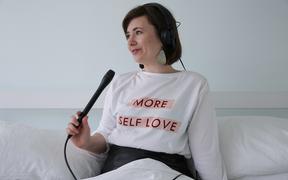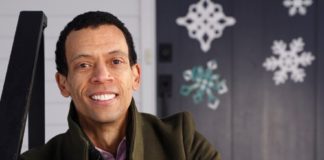The rest of the country moved to level 2 this morning, but for poor old Aucklanders still in level 4, RNZ podcast producer Justin Gregory has some podcast recommendations to keep you entertained.
True crime: Serial, season one

The Serial team
Photo: Sandy Honig
Look, I know you’ve probably listened to this show already, but, amazingly, there are people who haven’t yet. The first season of Serial investigates the murder of an 18-year-old high school student whose body was discovered in a park. It’s the ancestor of pretty much every narrative podcast made since and all the producers I know steal freely from the techniques Sarah Koenig and Julie Snyder invent and deploy brilliantly. For new listeners (and new podcast makers), listening to season one of Serial is like doing your basic training. But far more important than that, it’s a great piece of storytelling. Season two; not so much.
Honourable mention: Gone Fishing. Mayhem and murder (maybe) in West Auckland. The best true crime story you’ve never heard. Full disclosure: I did help make this series but it’s a stonking story and one of the most successful New Zealand podcasts of all time.
Politics: Slow Burn, seasons one to five
This is politics and history as a mirror on contemporary life. Season one covers the Watergate scandal and asks how an obviously crooked president was still able to be so popular with his base. Season two is the Clinton impeachment and the shabby story of how badly one young woman was treated by basically everyone. For a change of pace, season three charts the friendship, fallout and murders of Tupac and Biggie. Ex-Klansman and neo-Nazi David Duke gets the treatment in season four as he turns a wedge of angry, disappointed and forgotten voters into a major political force. And season five is about the fog of lies and spin that convinced an unlikely coalition of conservatives and liberals to support the invasion of Iraq. And without ever once mentioning his name, almost every season is, in subtle and not so subtle ways, about the rise and rule of President Trump.
Ideas: The Argument
“Cockamamie!” That’s the angriest word I’ve yet heard from any participant in the New York Times podcast The Argument. It bills itself as strongly held opinions and open-minded debate and that’s exactly what it is. The secret sauce behind the podcast’s success is host Jane Coaston. She’s not just a moderator (although she does that very well) but also weighs-in with her own arguments and states her own position clearly. Coaston generally comes off as fairer and often smarter than some of her guests but then she does get to edit each episode. And the topics aren’t lightweight. They argue critical race theory, vaccine mandates, abortion rights. But what got one guest so worked up he called his opponent’s argument “cockamamie”? Whether we should be trying to contact aliens or not.
Social Issues: What’s Wrong with You?
Three disabled women have made a great new podcast for Stuff about all the questions able-bodied people ask, including the biggie: what’s wrong with you? You can’t help but think “what’s wrong with us that we need to ask?” should more often be the reply. Topics cover dating with a disability, travelling, self-image, media representation and reimagining the world for disabled people. This isn’t a polite podcast. Instead, it’s a community of people having the conversations with each other that they want to have. The rest of us are invited to listen and hopefully understand just a bit better. And to stop asking those questions!
Music: Your Favourite Band Sucks
This podcast pretty much does what it says on the tin. All bands are overrated, argue the two hosts, who are every music nerd you’ve ever met at a party but way more entertaining – and way more vicious. The pair don’t so much cut bands with big reputations down to size as they do slice and dice them. I cried with laughter when they proved Smashing Pumpkins songs are nothing more than slowed-down 80s hair metal. And poor Edge from U2 gets savaged for his lack of chops (‘If at any point I refer to what happens when he touches his guitar as “guitar playing”, then that was inadvertent”). They can go too far. I didn’t need four episodes to convince me that Christmas music sucks. And when they go beyond the music to argue that the musicians as people suck just as much if not more, it’s a miracle they don’t get sued. But that’s why I listen. In small amounts.
Honourable mention: Hit Parade. Actual music journalism with a more generous spirit.
Te Ao Māori
He Kākanou Ahou

Photo: Supplied
I’m not going to apologise for including a podcast made for RNZ in this list because it is just that good. He Kākanou Ahou takes on the idea that being urban Māori means you are less connected to your culture. Host Kahu Kutia doesn’t believe that’s true and in the first season she meets a range of Māori in our cities to prove it by connecting their stories with each other and with their sense of identity. This podcast jointly won a Voyager Media Award in 2020 and deserved to. Good news; there are two seasons and in the second the focus moves to a possible future of Aotearoa. If you haven’t already, then you should listen to He Kākanou Ahou and feed your brain and your soul through your ears.
0800 Matariki
Short, sweet and beautifully made, this is a bilingual series of stories about the stars in the Matariki Cluster. Stacey and Scott Morrison and Rhonda Tibble are your storytellers and over a rich soundtrack of taonga puoro and environmental sounds they gently lead you through. The form and production of this podcast are perfect, not just for their own sake but because they deepen the listener’s understanding and contextualise the meaning and importance of the stars to people and place. Each story is just a few minutes long and are perfect for tamariki as well as students of te reo Māori. I adore this podcast.
Comedy: My Year in Mensa
Very fast, very funny, very badly edited and completely self-aware, this is meta-podcasting by Millennial comedian Jamie Loftus. As a drunken joke, Loftus takes the test to join Mensa, the high IQ club for “rich assholes who think they’re smarter than everyone”. The series isn’t just about her disastrous year among the Mensans and the five days she spent at the worst convention anyone has ever attended. It’s also about social media pile-ons, social awkwardness as a cover for aggression and argues against elitism and unnecessary divisions between groups of people. Loftus’ style of storytelling falls completely outside my experience, let alone my age group and unlike most podcasts, you have to listen actively because if you blink, you’ll miss something. As Loftus says, ‘Keep up, Smarty’. But I adored My Year in Mensa and laughed a lot, just like the idiot I am.
Honourable mention: The Bugle. RNZ podcaster William Ray is a big fan of what he rightfully calls “probably the most successful comedy podcast of all time”. Host Andy Zaltman is also an amazing cricket writer and superfan. Cricket.
Drama: The 200 Year Old
I’m cheating here a little bit because I haven’t finished this podcast yet. But 200 Year Old has a grip on me and I keep looking for opportunities to listen to more. This docudrama is set in 2218 and tells the story of a South African woman called Lesedi Nabadause who is about to turn 200 years old. It uses a mix of fiction and existing scientific research to describe a world that is very different from ours. What does money mean, how do you maintain a marriage for so long, how will family and society change? The podcast is a bit odd because it’s backed by a financial group called Sanlam who are all about future planning. Nice tie-in but you have to have some questions about their motives. But most importantly it’s a great listen, especially while you’re checking your wealth portfolio.
Science: Wild Thing
Science, you say? Bigfoot and extraterrestrial life, huh? Yeah, I know, but Wild Thing is a series about the intersection between science and society and why we want to believe in unlikely things. Host Laura Krantz rigorously and cheerfully examines the evidence and her own hopes and beliefs, talks to experts and ordinary people with extraordinary experiences and deals with them all evenhandedly. She’s also got no problem dismissing unrealistic dreamers, or “the Woo”, as they’re called. And the podcast is fun, too. Season one has some genuinely poo-your-pants stories about encounters with Bigfoot, and season two gets as close to extraterrestrial encounters as you can without probes being involved. For extra fun, listen late at night without anyone else in the house. Sweet dreams!
History: Cautionary Tales with Tim Harford
If you think you’ve ever stuffed up, then have a listen to this series and feel better about yourself. Not that many of us have steered a giant ship onto a rock because we just couldn’t believe we got our bearings wrong or have drunkenly hijacked a plane and insisted it fly to the other side of the world. But almost all of us have made mistakes and refused to admit it or ignored the advice of people who know better than us. And that’s the genius of this series. Each story contains a warning, a moral, and is meant to teach us something we need to know. Host Tim Harford thinks of the series as fables for grownups, but you don’t need to worry about being lectured to. Harford is a gentle, non-judgmental guide and he’s here to help. Cautionary Tales has a lot to tell us about contemporary life, too. Check out the episode on how to end a pandemic, or the mini-episode about the danger of doubting statistics. You’ve been cautioned.
My Favourite Podcast: BANG!

Melody Thomas
Photo: Richard Tindiller.
I don’t mind admitting that I have a deep professional jealousy of this podcast. Host Melody Thomas gets the most remarkable range of people to tell amazing stories about sex and relationships. Where did she find them? How did she get them to talk? But she did, so if you want to hear real people (including Melody’s mum) talking about everything to do with doing it, then BANG! gives you more for your buck. There are three seasons of stories that cover everything from straight men meeting up for anonymous gay sex, the challenge of monogamy over a lifetime, sex in your seventies in a rest home, toxic masculinity, decolonising sexuality and gender and a special episode of answers to FAQs. There are two live shows, as well, recorded in front of audiences in Auckland and Christchurch. BANG! is the business and I really hope there will be more seasons to come in the future. When they do arrive, I’ll probably still be sulking.







